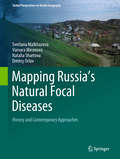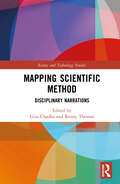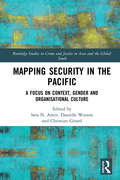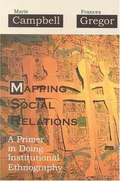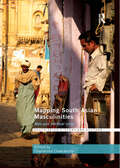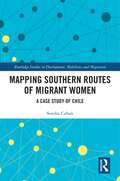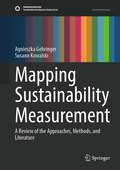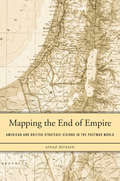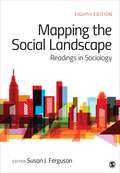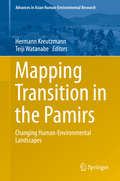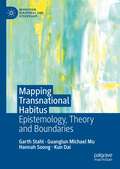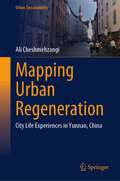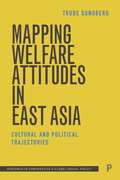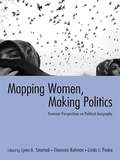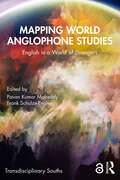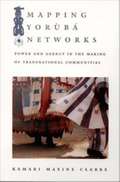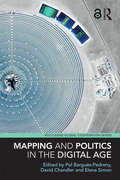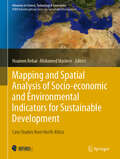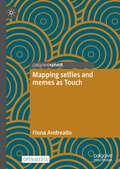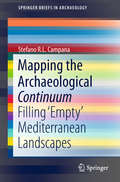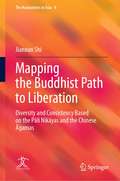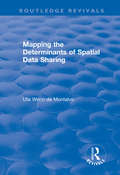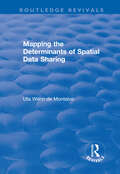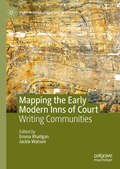- Table View
- List View
Mapping Russia's Natural Focal Diseases: History And Contemporary Approaches (Global Perspectives on Health Geography)
by Dmitry Orlov Svetlana Malkhazova Varvara Mironova Natalia Shartova Vadim Rumyantsev Mikhail SoldatovThis book is the first scientific publication on diseases caused by agents circulating in natural environments independently from humans, covering the whole territory of the Russian Federation. It contains diverse and multifaceted information, both in textual and cartographic form.The book focuses on the historical and current distribution of natural-focal diseases in Russia, epidemiological aspects, natural and socio-economic determinants conducing natural foci. With a series of maps this book depicts population morbidity rates in particular regions and on a national level for the 21st century.With numerous color illustrations this book appeals to a wide audience and is of particular interest to geographers, environmental workers, epidemiologists and other specialists interested in environmental and public health issues.
Mapping Scientific Method: Disciplinary Narrations (Science and Technology Studies)
by Gita Chadha and Renny ThomasThis volume explores how the scientific method enters and determines the dominant methodologies of various modern academic disciplines. It highlights the ways in which practitioners from different disciplinary backgrounds –– the humanities, the natural sciences, and the social sciences –– engage with the scientific method in their own disciplines. The book maps the discourse (within each of the disciplines) that critiques the scientific method, from different social locations, in order to argue for more complex and nuanced approaches in methodology. It also investigates the connections between the method and the structures of power and domination which exist within these disciplines. In the process, it offers a new way of thinking about the philosophy of the scientific method. Part of the Science and Technology Studies series, this volume is the first of its kind in the South Asian context to debate scientific methods and address questions by scholars based in the global south. It will be useful to students and practitioners of science, humanities, social sciences, philosophy of science, and philosophy of social science. Research scholars from these disciplines, especially those engaging in interdisciplinary research, will also benefit from this volume.
Mapping Security in the Pacific: A Focus on Context, Gender and Organisational Culture (Routledge Studies in Crime and Justice in Asia and the Global South)
by Danielle Watson Sara N. Amin Christian GirardThis book examines questions about the changing nature of security and insecurity in Pacific Island Countries (PICs). Previous discussions of security in the Pacific region have been largely determined by the geopolitical interests of the Global North. This volume instead attempts to centre PICs’ security interests by focussing on the role of organisational culture, power dynamics and gender in (in)security processes and outcomes. Mapping Security in the Pacific underscores the multidimensional nature of security, its relationship to local, international, organisational and cultural dynamics, the resistances engendered through various forms of insecurities, and innovative efforts to negotiate gender, context and organisational culture in reducing insecurity and enhancing justice. Covering the Pacific region widely, the volume brings forth context-specific analyses at micro-, meso- and macro-levels, allowing us to examine the interconnections between security, crime and justice, and point to the issues raised for crime and justice studies by environmental insecurity. In doing so, it opens up opportunities to rethink scholarly and policy frames related to security/insecurity about the Pacific. Written in a clear and direct style, this book will appeal to students and scholars in criminology, sociology, cultural studies, social theory and those interested in learning about the Pacific region and different aspects of security.
Mapping Social Relations: A Primer in Doing Institutional Ethnography
by Marie Campbell Frances GregorThis is a book about a distinctive methodological approach inspired by one of Canada's most respected scholars, Dorothy Smith. Institutional ethnography aims to answer questions about how everyday life is organized. What is conventionally understood as "the relationship of micro to macro processes" is, in institutional ethnography, conceptualized and explored in terms of ruling relations. The authors suggest that institutional ethnographers must adopt a particular research stance, one that recognizes that people's own knowledge and ways of knowing are crucial elements of social action and thus of social analysis. Specific attention to text analysis is integral to the approach as is a sensitive to gender relations. Institutional ethnography is remarkably well suited to the human service curriculum and the training of professionals and activists. Its strategy for learning how to understand problems existing in everyday life appeals to many researchers who are looking for guidance on how to take practical action. At the same time, the highly elaborated theoretical foundation of institutional ethnography is difficult to deal with in the brief time most students are in the classroom. The authors successfully tackle the issue of teaching and applying institutional ethnography. Campbell and Gregor have been testing out instructional methods and materials for many years. MAPPING SOCIAL RELATIONS is the product of that effort.
Mapping South Asian Masculinities: Men and Political Crises (South Asian History and Culture)
by Chandrima ChakrabortyThis book offers the first substantial critical examination of men and masculinities in relation to political crises in South Asian literatures and cultures. It employs political crisis as a frame to analyze how South Asian men and masculinities have been shaped by critical historical events, events which have redrawn maps and remapped or unmapped bodies with different effects. These include colonialism, anti-colonialism, state formations, civil wars, religious conflicts, and migration. Political crisis functions as a framing device to offer nuances and clarifications to the assumed visibility of male bodies and male activities during political crisis. The focus on masculinities in historical moments of crisis divests masculinity of its naturalization and calls for a heterogeneous conceptualization of the everyday practices and experiences of ‘being a man.’ Written by scholars from a variety of theoretical perspectives and disciplinary approaches, and drawing on a range of written and visual texts, this book contributes to this recent rethinking of South Asian literary and cultural history by engaging masculinity as a historicized category of analysis that accommodates an understanding of history as differentiated encounters among bodies, cultures, and nations. This book was originally published as a special issue of South Asian History and Culture.
Mapping Southern Routes of Migrant Women: A Case Study of Chile (Routledge Studies in Development, Mobilities and Migration)
by Sondra CubanWhereas most migration research still focuses on South to North migration, this book shines a light on mobilities within the Global South. Using migration to and within Chile as a case study, the book looks at the experiences of women, who make up a large proportion of migrants within Latin America. Mapping the experiences, aspirations and struggles of women moving to and in Chile, the book exposes the unexpected issues encountered by migrant women in their new destination country, particularly the discrimination that leaves them feeling invisible, unsettled, and, immobile. Within the region there is a long history of feminized migration and domestic labour circuits that spurs migrants’ residential movements but slows their social progress. Yet despite these challenges, the migrant women expressed their agency through the support networks they created among their compatriots and their transnational families. Overall, the book demonstrates the growing migrant populations that exist within the Global South and the impact of domestic and care labour markets in driving gendered migration in particular. This book will be of interest to researchers and advanced students in the fields of mobilities and migration, cultural geography, international development, and gender studies, especially those with an interest in Latin America.
Mapping Sustainability Measurement: A Review of the Approaches, Methods, and Literature (Sustainable Development Goals Series)
by Agnieszka Gehringer Susann KowalskiThis book explores modern approaches to sustainability and its measurement. It thoroughly reviews a wide range of existing sustainability measurement systems. Accordingly, the book documents the state of progress toward sustainability measurement by first assessing the past development of wellbeing measurement going beyond GDP and synthesizing the various conceptual approaches to sustainability and its dimensions. It then explores crucial methodological aspects that stay at the core of constructing a sound index system. In the main part of the book, we map the available indices or index systems, their conceptual and methodological backgrounds as well as approaches, which have not yet resulted in an index, but have the potential to contribute to a better understanding of sustainability. More specifically, the book assesses the scope, motivation, and potential usage of each index. It also documents their limitations and drawbacks. This mapping exercise is useful for policymakers, researchers, and practitioners as it offers a detailed and compact overview of where we are and what we still need to account for when measuring sustainability.
Mapping The End Of Empire: American And British Strategic Visions In The Postwar World
by Aiyaz HusainBy the end of World War II, strategists in Washington and London looked ahead to a new era in which the United States shouldered global responsibilities and Britain concentrated its regional interests more narrowly. The two powers also viewed the Muslim world through very different lenses. Mapping the End of Empire reveals how Anglo-American perceptions of geography shaped postcolonial futures from the Middle East to South Asia. <p><p> Aiyaz Husain shows that American and British postwar strategy drew on popular notions of geography as well as academic and military knowledge. Once codified in maps and memoranda, these perspectives became foundations of foreign policy. In South Asia, American officials envisioned an independent Pakistan blocking Soviet influence, an objective that outweighed other considerations in the contested Kashmir region. Shoring up Pakistan meshed perfectly with British hopes for a quiescent Indian subcontinent once partition became inevitable. But serious differences with Britain arose over America's support for the new state of Israel. Viewing the Mediterranean as a European lake of sorts, U.S. officials--even in parts of the State Department--linked Palestine with Europe, deeming it a perfectly logical destination for Jewish refugees. But British strategists feared that the installation of a Jewish state in Palestine could incite Muslim ire from one corner of the Islamic world to the other. <p> As Husain makes clear, these perspectives also influenced the Dumbarton Oaks Conference and blueprints for the UN Security Council and shaped French and Dutch colonial fortunes in the Levant and the East Indies.
Mapping The Social Landscape: Readings in Sociology
by Susan J. Joann FergusonNow with SAGE Publishing, Mapping the Social Landscape: Readings in Sociology is one of the most established and widely-used anthologies for Introductory Sociology. Susan J. Ferguson selects, edits, and introduces 58 readings representing a plurality of voices and views within sociology. <P><P>The selections include classic statements from great thinkers like C. Wright Mills, Karl Marx, Howard Becker, and Max Weber, as well as the works of contemporary scholars who address current social issues. Many of the readings integrate questions of diversity, helping students see the interrelationships among race-ethnicity, social class, and gender, and understand how these relationships have shaped the experiences of all people in society.
Mapping Transition in the Pamirs
by Hermann Kreutzmann Teiji WatanabeBy emphasizing on the Pamir region a comprehensive overviewof path-dependent and recent developments in a remote mountain region isprovided in this book. Overall neglect in the mountainous periphery iscontrasted by shifting the centre of attention to the Pamirssituated at the interface between South and Central Asia. From colonialtimes to now there has been a debate on grasping and locating the area. Herefield-work based contributions are collected to provide a variety ofperspectives on the Pamirs highlighting transformation and transition inPost-Soviet societies as well as in Afghanistan and Pakistan. The similarecological environment across borders features the common groundwhile analyzing development processes in a set of case studies that aim athighlighting certain aspects of regional development.
Mapping Transnational Habitus: Epistemology, Theory and Boundaries (Migration, Diasporas and Citizenship)
by Guanglun Michael Mu Garth Stahl Hannah Soong Kun DaiThis book surveys and critiques existing empirical and theoretical literature on the Bourdieu-informed concept of transnational habitus. The term "transnational” has been used widely in studies of migration research where it has allowed scholars to have a deeper understanding of the practices not only of migrants moving across national borders but also of agents taking positions in transnational spaces without necessarily criss-crossing different nation states. Focusing on the potential of transnational habitus as an analytical tool, the authors propose a model of transnational habitus to identify integral key factors for the operationalisation in research. Drawing on reflexivity, the authors analyse transnational selves and map transnational spaces of classification. Identifying strengths, inconsistencies and key problems in this rapidly developing body of literature, this interdisciplinary and international book will be of interest to students and scholars in sociology, anthropology, migration studies, cultural studies, human geography, as well as diaspora studies.
Mapping Urban Regeneration: City Life Experiences in Yunnan, China (Urban Sustainability)
by Ali CheshmehzangiThis book is an unusual attempt to study urban regeneration. First, it is based on mapping the realities of urban regeneration case study examples and their impacts on people, places, and city life experiences. Second, it is context-specific, exploring only a particular region rather than covering one country or multiple locations. Hence, the aim is to avoid generic and global solutions but rather focus on local pathways and directions. Third, it delves into specific case study examples that could share some lessons for research, practice, and academia, particularly in the field of urban regeneration. This book is the first of (hopefully) many more on the way in urban mapping studies with various themes and focus areas. The ultimate goal is to ensure urban mapping is recognized well and practiced extensively in research and education. It is essential to map realities in cities and communities, those that we usually witness but should be experienced, perceived, and touched—not just via desk research. Mapping techniques are more than just common tools in urbanism, urban geography, urban studies, urban planning, etc. They are not just tools but inventive ways of understanding cities, places, communities, experiences, and people. Thus, in this book, we try to understand more about people and places through life experiences and mapping the urban regeneration projects of multiple cities in Yunnan Province. This collection is based on a very concise context-specific research focused on only one region. The decision to do so is intentional, just because contextual, cultural, and local attributes need to be looked at more accurately, considerably, and dexterously. Hence, this collection delves into case study examples of an inspiring location where traditions remain, resources are plenteous, and cultures are diverse. Yunnan is one of the few provinces left in China that offers a lot for comprehensive research studies at the urban, rural, and township levels. The experiences we gained from mapping studies, observations, and multi-stakeholder engagements are exceptionally rich and vibrant, allowing us to think more holistically and find ways and suggestions beyond just the generic globalized models elsewhere. We hope the book will be useful to various stakeholders, particularly urban specialists, researchers, and students. It is also a valuable collection for policymakers, decision-makers, and governmental authorities, who should refrain from top-down processes and bring back people to the heart of urban regeneration processes.
Mapping Welfare Attitudes in East Asia: Cultural and Political Trajectories (Research in Comparative and Global Social Policy)
by Trude SundbergEast Asian societies and welfare systems are rapidly changing, creating an increasing need for research that can help to establish sustainable and legitimate welfare systems. This original volume considers welfare attitudes in East Asia, including Mainland China, Hong Kong, Japan, Korea, Macao, Singapore and Taiwan, using qualitative and quantitative research methods. Proposing new methods and approaches to analysing cross-national variations in welfare attitudes, it decentralises dominant European-based concepts and measurements and takes approaches that are sensitive to cultural and political trajectories and the impact of colonialism and gender. This book explores the influence of contextual and individual factors, such as family roles and values, on citizens’ welfare attitudes. It also studies social legitimacy and social bonds to understand how to design and implement sustainable welfare policies.
Mapping White Identity Terrorism and Racially or Ethnically Motivated Violent Extremism: A Social Network Analysis of Online Activity
by Todd C. Helmus Brian A. Jackson William Marcellino Luke J. Matthews Heather J. Williams James V. Marrone Matthew A. DeNardo Pauline MooreThe authors reviewed literature on White identity terrorism and racially or ethnically motivated violent extremism (REMVE) and analyzed social media data from six platforms that host extremist content. They developed a network map that evaluates REMVE network construction, connectivity, geographic location, and proclivity to violence and found that users in the United States are overwhelmingly responsible for REMVE discourse online.
Mapping Women, Making Politics: Feminist Perspectives on Political Geography
by Eleonore Kofman Lynn A. Staeheli Linda J. PeakeMapping Women, Making Politics demonstrates the multiple ways in which gender influences political processes and the politics of space. The book begins by addressing feminism's theoretical and conceptual challenges to traditional political geography and than applies these perspectives to a range of settings and topics including nationalism, migration, development, international relations, elections, social movements, governance and the environment in the Global North and South.
Mapping World Anglophone Studies: English in a World of Strangers (Transdisciplinary Souths)
by Pavan Kumar Malreddy Frank Schulze-EnglerThis book explores core issues in the emerging field of World Anglophone Studies. It shows that traditional frameworks based on the colonial and imperial legacies of English need to be revised and extended to understand the complex adaptations, iterations, and incarnations of English in the contemporary world.The chapters in this volume make three significant interventions in the field: First, they showcase the emergence of Anglophone literatures and cultures in parts of the world not traditionally considered Anglophone – Cuba, the Arab world, the Balkan region, Vietnam, Algeria, and Belize, among others Second, they feature new zones of contact and creolization between Anglophone literatures, cultures, and languages such as Swahili, Santhali, Ojibway, and Hindi, as well as Anglophone representations of colonial encounters and contemporary experiences in non-Anglophone settings such as Cuba, Angola, and Algeria And finally, the volume turns to Anglophone literary and cultural productions on new platforms such as social media and Netflix and highlights the role of English in emergent sites of resistance involving women, Indigenous populations, queer and other non-heteronormative sexualities, as well as post-conflict societies Mapping linguistic transgressions and the transmigration of cultural tropes between Englishes, vernaculars, and a wide variety of other languages with a rich set of case studies, this volume will be essential reading for courses such as world literatures in English, postcolonial studies, anglophone studies, literature and culture, Indian Ocean worlds, Global Englishes, and Global South studies.
Mapping Yorùá Networks
by Kamari Maxine ClarkeThree flags fly in the palace courtyard of ytnj African Village. One represents black American emancipation from slavery, one black nationalism, and the third the establishment of an ancient Yorb Empire in the state of South Carolina. Located sixty-five miles southwest of Charleston, ytnj is a Yorb revivalist community founded in 1970. Mapping Yorb Networks is an innovative ethnography of ytnj and a theoretically sophisticated exploration of how Yorb rs voodoo religious practices are reworked as expressions of transnational racial politics. Drawing on several years of multisited fieldwork in the United States and Nigeria, Kamari Maxine Clarke describes ytnj in vivid detail--the physical space, government, rituals, language, and marriage and kinship practices--and explores how ideas of what constitutes the Yorb past are constructed. She highlights the connections between contemporary Yorb transatlantic religious networks and the post-1970s institutionalization of roots heritage in American social life. Examining how the development of a deterritorialized network of black cultural nationalists became aligned with a lucrative late-twentieth-century roots heritage market, Clarke explores the dynamics of ytnj Village's religious and tourist economy. She discusses how the community generates income through the sale of prophetic divinatory consultations, African market souvenirs--such as cloth, books, candles, and carvings--and fees for community-based tours and dining services. Clarke accompanied ytnj villagers to Nigeria, and she describes how these heritage travelers often returned home feeling that despite the separation of their ancestors from Africa as a result of transatlantic slavery, they--more than the Nigerian Yorb--are the true claimants to the ancestral history of the Great y Empire of the Yorb people. Mapping Yorb Networks is a unique look at the political economy of homeland identification and the transnational construction and legitimization of ideas such as authenticity, ancestry, blackness, and tradition.
Mapping and Politics in the Digital Age (ISSN)
by Pol Bargués-PedrenyThroughout history, maps have been a powerful tool in the constitutive imaginary of governments seeking to define or contest the limits of their political reach. Today, new digital technologies have become central to mapping as a way of formulating alternative political visions. Mapping can also help marginalised communities to construct speculative designs using participatory practices. Mapping and Politics in the Digital Age explores how the development of new digital technologies and mapping practices are transforming global politics, power, and cooperation.The book brings together authors from across political and social theory, geography, media studies and anthropology to explore mapping and politics across three sections. Contestations introduces the reader to contemporary developments within mapping and explores the politics of mapping as a form of knowledge and contestation. Governance analyses mapping as a set of institutional practices, providing key methodological frames for understanding global governance in the realms of urban politics, refugee control, health crises and humanitarian interventions and new techniques of biometric regulation and autonomic computation. Imaginaries provides examples of future-oriented analytical frameworks, highlighting the transformation of mapping in an age of digital technologies of control and regulation. In a world conceived as without borders and fixed relations, new forms of mapping stress the need to rethink assumptions of power and knowledge.This book provides a sophisticated and nuanced analysis of the role ofmapping in contemporary global governance, and will be of interest to students and researchers working within politics, geography, sociology, media, and digital culture and technology.The Open Access version of this book, available at http://www.taylorfrancis.com, has been made available under a Creative Commons Attribution-Non Commercial-No Derivatives (CC-BY-ND) 4.0 license.
Mapping and Spatial Analysis of Socio-economic and Environmental Indicators for Sustainable Development: Case Studies from North Africa (Advances in Science, Technology & Innovation)
by Noamen Rebai Mohamed MastereThis book presents most recent research studies on mapping and spatial analysis of socio-economic and environmental indicators used by various national and international contributors to regional development projects. It gathers the best contributions to the 1st International Conference on Mapping and Spatial Analysis of Socio-Economic and Environmental Indicators for the Local and Regional Sustainable Development. The conference was held in southern Tunisia, Tataouine in March 2015.The research studies focused on generating and analyzing indicators in various domains of Agriculture, Energy, Industry, Tourism, Transport, Urban Planning, Exploitation of Natural Resources, Infrastructure, Health, Environment, Education, Information and Communication Technologies, Social Affairs and Employability, and Culture and Sport. Socio-economic and environmental indicators are important in regional development plans and strategies as they allow to observe and analyze changes in the economic growth and to measure their impact on the environment and on social networks/daily life of citizens. On the basis of well-defined geomatic approaches, and particularly, through sophisticated digital mapping and spatio-temporal analyses, authors focused on retrieving indicators to evaluate the exploitation rate of natural resources, intensity of the energy consumption in various economic sector, net migratory flows, quality checking of the air in urban areas, adaptation to climate change, and vulnerability of the coastal domain and risk of marine submersion due to sea-level rise. The book is of interest not only to investors and contributors to regional development projects, but also to all relevant policy makers.
Mapping selfies and memes as Touch
by Fiona AndrealloThis open access book offers a rich and nuanced analysis of digitally networked socialities as culturally meaningful relationships of Touch. Focusing on the ways Touch is practised in everyday social interactions serves as a basis for how Touch is understood as multiply significant – physically, emotionally, intellectually and politically. Andreallo initiates a map of the fundamentals of Touch and how they can be considered for future research in considering digitally networked cultures. This map also serves as a basis for closely examining selfies and memes. Examining social networks of Touch, Andreallo focuses on a specific example of the PrettyGirlsUglyFaces meme and ugly selfies(uglies). Through this example, memes and selfies are mapped as Touch involving textures of both intimacy and violence. Andreallo also discusses technological seamlessness and cultural semefulness as conversations of social relationships of Touch, and proposes the term semeful sociabilities to describe how the everyday technological self engages in practices of Touch. This book is a compact, approachable insight into selfies and memes as everyday culturally networked Touch relationships that also offers a way forward in recognising technological relationships as culturally meaningful.
Mapping the Archaeological Continuum: Filling 'empty' Mediterranean Landscapes (Springerbriefs In Archaeology Ser.)
by Stefano R.L. CampanaThis book addresses the true 'landscape' perspective approach that archaeologists in Italy, and in many parts of the Mediterranean, use to study the archaeology of landscapes, marking a departure from the traditional site-based approach. The aim of the book is to promote the broader application of new paradigms for landscape analysis, combining traditional approaches with multidisciplinary studies as well as comparatively new techniques such as large-scale geophysical surveying, airborne laser scanning and geo-environmental studies. This approach has yielded tangible and striking results in central Italy, clearly demonstrating that identifying the 'archaeological continuum' is a realistic aim, even under the specific environmental and archaeological conditions of the Mediterranean world.
Mapping the Buddhist Path to Liberation: Diversity and Consistency Based on the Pāli Nikāyas and the Chinese Āgamas (The Humanities in Asia #9)
by Jianxun ShiDue to the diversity in Buddhism, its essence remains a puzzle. This book investigates the Buddhist path to liberation from a practical and critical perspective by searching for patterns found in the Pāli Nikāyas and the Chinese Āgamas. The early discourses depict the Buddhist path as a network of routes leading to the same goal: liberation from suffering. This book summarizes various teachings in three aspects, provides a template theory for systematically presenting the formulas of the sequential training of the path, and analyses the differences and similarities among diverse descriptions of the path in the early Buddhist texts. By offering a comprehensive map of the Buddhist path, this book will appeal to scholars and students of Buddhist studies as well as those practitioners with a serious interest in the Buddhist path.
Mapping the Determinants of Spatial Data Sharing
by Uta Wehn de MontalvoThis title was first published in 2003. With the increasing use of GIS in industrialised and developing countries, the availability of spatial data has become an issue that affects many public and private sector organisations. They are faced with the high cost and substantial effort involved in the generation of spatial data and so the sharing of this data is increasingly being seen as a way of overcoming expense and easing availability and access. But this can provide a way of using GIS effectively only if the key players involved in the use and supply of spatial data are willing to share. This book employs a theory from social psychology as an organising framework to systematize the determinants of organisations' spatial data sharing behaviour. It develops a model which explains the likely willingness of key individuals within organisations to engage in spatial data exchanges across organisational boundaries and then tests this on a survey based in South Africa.
Mapping the Determinants of Spatial Data Sharing (Routledge Revivals)
by Uta Wehn de MontalvoThis title was first published in 2003. With the increasing use of GIS in industrialised and developing countries, the availability of spatial data has become an issue that affects many public and private sector organisations. They are faced with the high cost and substantial effort involved in the generation of spatial data and so the sharing of this data is increasingly being seen as a way of overcoming expense and easing availability and access. But this can provide a way of using GIS effectively only if the key players involved in the use and supply of spatial data are willing to share. This book employs a theory from social psychology as an organising framework to systematize the determinants of organisations' spatial data sharing behaviour. It develops a model which explains the likely willingness of key individuals within organisations to engage in spatial data exchanges across organisational boundaries and then tests this on a survey based in South Africa.
Mapping the Early Modern Inns of Court: Writing Communities (Early Modern Literature in History)
by Emma Rhatigan Jackie WatsonThis collection of essays presents recent research on the Inns of Court and their place in the literature and culture of the early modern world. The volume is structured in three sections. Section One looks at the institutional spaces of the Inns themselves. The chapters consider how the Innsmen&’s identities and writings were shaped by their participation in the communal life of the legal Societies. Section Two looks at the Inns in the context of early modern London. The chapters attend to the intellectual and cultural traffic between the Inns and the city in which they were located by examining the role of Innsmen in the book trade, the circulation of manuscripts, playhouses, and musical culture. Finally, Section Three sets a wider international context. The chapters focus on the role of Innsmen in translation, nation-building, and early colonisation. Together these sections attend to the Innsmen not only as writing communities in themselves, but as participants in a complex of intersecting networks reaching out into London and beyond.
